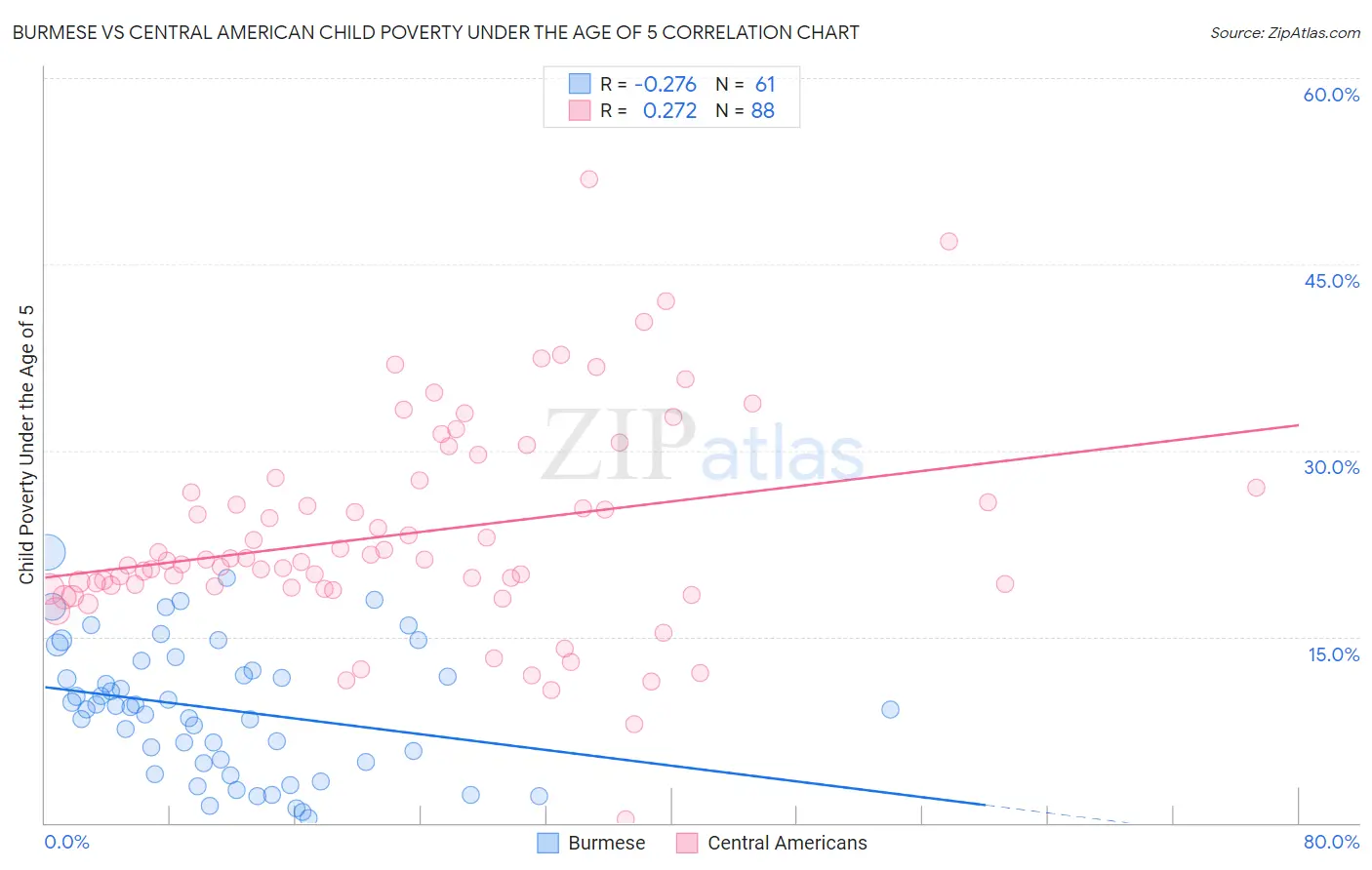Burmese vs Central American Child Poverty Under the Age of 5
COMPARE
Burmese
Central American
Child Poverty Under the Age of 5
Child Poverty Under the Age of 5 Comparison
Burmese
Central Americans
13.2%
CHILD POVERTY UNDER THE AGE OF 5
100.0/ 100
METRIC RATING
10th/ 347
METRIC RANK
20.6%
CHILD POVERTY UNDER THE AGE OF 5
0.1/ 100
METRIC RATING
273rd/ 347
METRIC RANK
Burmese vs Central American Child Poverty Under the Age of 5 Correlation Chart
The statistical analysis conducted on geographies consisting of 442,195,758 people shows a weak negative correlation between the proportion of Burmese and poverty level among children under the age of 5 in the United States with a correlation coefficient (R) of -0.276 and weighted average of 13.2%. Similarly, the statistical analysis conducted on geographies consisting of 480,879,905 people shows a weak positive correlation between the proportion of Central Americans and poverty level among children under the age of 5 in the United States with a correlation coefficient (R) of 0.272 and weighted average of 20.6%, a difference of 55.7%.

Child Poverty Under the Age of 5 Correlation Summary
| Measurement | Burmese | Central American |
| Minimum | 0.42% | 0.31% |
| Maximum | 21.8% | 51.8% |
| Range | 21.3% | 51.5% |
| Mean | 9.2% | 23.3% |
| Median | 9.3% | 21.2% |
| Interquartile 25% (IQ1) | 4.9% | 19.0% |
| Interquartile 75% (IQ3) | 12.7% | 27.3% |
| Interquartile Range (IQR) | 7.8% | 8.3% |
| Standard Deviation (Sample) | 5.3% | 8.5% |
| Standard Deviation (Population) | 5.2% | 8.5% |
Similar Demographics by Child Poverty Under the Age of 5
Demographics Similar to Burmese by Child Poverty Under the Age of 5
In terms of child poverty under the age of 5, the demographic groups most similar to Burmese are Immigrants from Korea (13.2%, a difference of 0.11%), Immigrants from South Central Asia (13.3%, a difference of 0.21%), Bhutanese (13.4%, a difference of 0.96%), Immigrants from Iran (13.1%, a difference of 1.1%), and Iranian (13.1%, a difference of 1.3%).
| Demographics | Rating | Rank | Child Poverty Under the Age of 5 |
| Filipinos | 100.0 /100 | #3 | Exceptional 11.6% |
| Thais | 100.0 /100 | #4 | Exceptional 12.3% |
| Immigrants | Hong Kong | 100.0 /100 | #5 | Exceptional 12.4% |
| Immigrants | Singapore | 100.0 /100 | #6 | Exceptional 12.9% |
| Chinese | 100.0 /100 | #7 | Exceptional 13.1% |
| Iranians | 100.0 /100 | #8 | Exceptional 13.1% |
| Immigrants | Iran | 100.0 /100 | #9 | Exceptional 13.1% |
| Burmese | 100.0 /100 | #10 | Exceptional 13.2% |
| Immigrants | Korea | 100.0 /100 | #11 | Exceptional 13.2% |
| Immigrants | South Central Asia | 100.0 /100 | #12 | Exceptional 13.3% |
| Bhutanese | 100.0 /100 | #13 | Exceptional 13.4% |
| Okinawans | 100.0 /100 | #14 | Exceptional 13.4% |
| Indians (Asian) | 100.0 /100 | #15 | Exceptional 13.4% |
| Immigrants | Eastern Asia | 100.0 /100 | #16 | Exceptional 13.5% |
| Assyrians/Chaldeans/Syriacs | 100.0 /100 | #17 | Exceptional 13.6% |
Demographics Similar to Central Americans by Child Poverty Under the Age of 5
In terms of child poverty under the age of 5, the demographic groups most similar to Central Americans are Immigrants from Belize (20.6%, a difference of 0.10%), Bangladeshi (20.6%, a difference of 0.15%), West Indian (20.6%, a difference of 0.24%), Immigrants from West Indies (20.7%, a difference of 0.41%), and Immigrants from Grenada (20.7%, a difference of 0.43%).
| Demographics | Rating | Rank | Child Poverty Under the Age of 5 |
| Aleuts | 0.1 /100 | #266 | Tragic 20.3% |
| Ottawa | 0.1 /100 | #267 | Tragic 20.3% |
| Belizeans | 0.1 /100 | #268 | Tragic 20.3% |
| Immigrants | Burma/Myanmar | 0.1 /100 | #269 | Tragic 20.4% |
| Jamaicans | 0.1 /100 | #270 | Tragic 20.4% |
| Americans | 0.1 /100 | #271 | Tragic 20.5% |
| Immigrants | Jamaica | 0.1 /100 | #272 | Tragic 20.5% |
| Central Americans | 0.1 /100 | #273 | Tragic 20.6% |
| Immigrants | Belize | 0.1 /100 | #274 | Tragic 20.6% |
| Bangladeshis | 0.1 /100 | #275 | Tragic 20.6% |
| West Indians | 0.0 /100 | #276 | Tragic 20.6% |
| Immigrants | West Indies | 0.0 /100 | #277 | Tragic 20.7% |
| Immigrants | Grenada | 0.0 /100 | #278 | Tragic 20.7% |
| Sub-Saharan Africans | 0.0 /100 | #279 | Tragic 20.8% |
| French American Indians | 0.0 /100 | #280 | Tragic 20.8% |